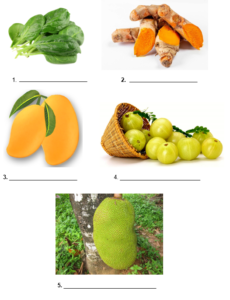Welcome to this The Story of Food class 3 EVS worksheet with answers. This ncert class 3 EVS chapter 14 worksheet is prepared by our expert teachers and follows the syllabus prescribed by CBSE.
The Story of Food Class 3 EVS Worksheet
These questions are based on the chapter The Story of Food for the Class 3 evs and this worksheet is in accordance with the NCERT book. Practice these questions for better grades in school. Do not forget to check The Story of Food MCQ Class 3 EVS Chapter 14 for this chapter.
NCERT class 3 EVS chapter 14 worksheet
Name the following
- What is the importance of work in families?
- Do all families eat together?
- Who does not help in cooking food in some families?
- What are some common medicinal plants?
- What is the importance of discussing food origin with children?
- Division
- No
- Children
- Ginger, turmeric, lemon, amla
- Promotes awareness
Give two examples of each
- Who helps cook?
- Where does food come from?
- Do families eat together?
- What parts of plants are eaten?
- What can we use for medicine?
- Family members and Kids
- Plants, animals, Farms, oceans, Nature provides
- It depends sometimes, Yes, most times
- Leaves, fruits, Flowers, stems, Roots, tubers, Seeds and grains.
- Ginger and turmeric
Fill in the blanks
- Filling water, cooking food, buying things from the market, sweeping, cleaning the utensils – these are examples of household __________.
- Plants provide us with many types of food, including fruits, vegetables, and __________.
- When we are sick, we may take medicine made from plants, such as __________ or turmeric.
- In many families, it is common to eat __________ as a group.
- Different parts of plants can be used for food, such as leaves, flowers, and __________.
- chores
- grains
- neem
- meals
- roots
True or False
- Plants are the only source of food for humans.
- All families eat their meals together.
- Medicinal plants have no benefits for human health.
- Gender roles in household work are the same in every family.
- All food items mentioned in the chapter come from either plants or animals.
- False
- False
- False
- False
- True
Answer the following questions
Question 1: What are some common medicinal plants and their uses?
Answer:
There are several common medicinal plants and their associated uses. Some examples include:
- Ginger: Used for stomachache and alleviating digestive issues like indigestion and bloating.
- Turmeric: Known for its anti-inflammatory properties and used to reduce inflammation and joint pain.
- Lemon: Used for cough and cold relief and also has healing properties for toothaches.
- Amla: Rich in vitamin C and commonly used to boost immunity and help with cough and cold symptoms.
- Ajwain: Often used for its ability to aid in digestion and provide relief from stomachaches and other digestive ailments.
Question 2: What are some tasks typically done in households and who does them?
Answer: Some common tasks in households include filling water, cooking food, buying from the market, sweeping, and cleaning utensils. The specific tasks may vary depending on the household and the abilities and availability of individuals.
Question 3: What are some foods that come from plants or animals?
Answer: There are various foods that come from plants, such as honey, corn, spinach, potato, and tomato. Foods that come from animals include fish, milk, eggs, and meat.
Question 4: What are some plant parts commonly eaten as food?
Answer: Different plant parts are commonly eaten as food, including flowers, fruits, leaves, stems, and roots. Examples of foods from these plant parts include mangoes, grams, spinach, lotus stems, curry leaves, and jackfruit.
Question 5: What are some factors that may influence how work is divided in a household?
Answer: Several factors can influence how work is divided in a household. These factors include age, ability, interest, and availability of individuals. Additionally, customs, traditions, and individual preferences may also play a role in determining how work is divided.
Identify the images

Answers:
- Spinach
- Turmeric
- Mango
- Amla
- Jackfruit
Leave a Reply